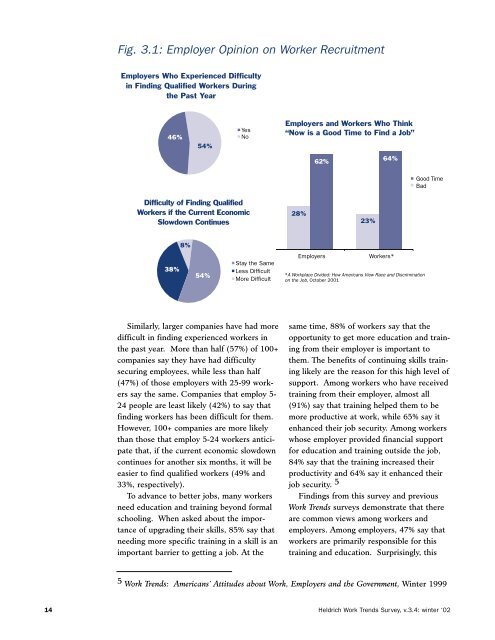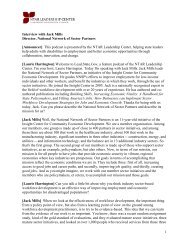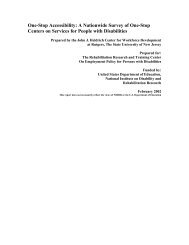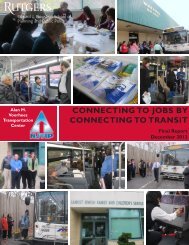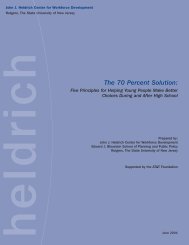Download - John J. Heldrich Center for Workforce Development ...
Download - John J. Heldrich Center for Workforce Development ...
Download - John J. Heldrich Center for Workforce Development ...
You also want an ePaper? Increase the reach of your titles
YUMPU automatically turns print PDFs into web optimized ePapers that Google loves.
Fig. 3.1: Employer Opinion on Worker Recruitment<br />
Employers Who Experienced Difficulty<br />
in Finding Qualified Workers During<br />
the Past Year<br />
46%<br />
54%<br />
Yes<br />
No<br />
Employers and Workers Who Think<br />
“Now is a Good Time to Find a Job”<br />
62%<br />
64%<br />
Good Time<br />
Bad<br />
Difficulty of Finding Qualified<br />
Workers if the Current Economic<br />
Slowdown Continues<br />
28%<br />
23%<br />
8%<br />
38%<br />
54%<br />
Stay the Same<br />
Less Difficult<br />
More Difficult<br />
Employers<br />
Workers*<br />
*A Workplace Divided: How Americans View Race and Discrimination<br />
on the Job, October 2001<br />
Similarly, larger companies have had more<br />
difficult in finding experienced workers in<br />
the past year. More than half (57%) of 100+<br />
companies say they have had difficulty<br />
securing employees, while less than half<br />
(47%) of those employers with 25-99 workers<br />
say the same. Companies that employ 5-<br />
24 people are least likely (42%) to say that<br />
finding workers has been difficult <strong>for</strong> them.<br />
However, 100+ companies are more likely<br />
than those that employ 5-24 workers anticipate<br />
that, if the current economic slowdown<br />
continues <strong>for</strong> another six months, it will be<br />
easier to find qualified workers (49% and<br />
33%, respectively).<br />
To advance to better jobs, many workers<br />
need education and training beyond <strong>for</strong>mal<br />
schooling. When asked about the importance<br />
of upgrading their skills, 85% say that<br />
needing more specific training in a skill is an<br />
important barrier to getting a job. At the<br />
same time, 88% of workers say that the<br />
opportunity to get more education and training<br />
from their employer is important to<br />
them. The benefits of continuing skills training<br />
likely are the reason <strong>for</strong> this high level of<br />
support. Among workers who have received<br />
training from their employer, almost all<br />
(91%) say that training helped them to be<br />
more productive at work, while 65% say it<br />
enhanced their job security. Among workers<br />
whose employer provided financial support<br />
<strong>for</strong> education and training outside the job,<br />
84% say that the training increased their<br />
productivity and 64% say it enhanced their<br />
job security. 5<br />
Findings from this survey and previous<br />
Work Trends surveys demonstrate that there<br />
are common views among workers and<br />
employers. Among employers, 47% say that<br />
workers are primarily responsible <strong>for</strong> this<br />
training and education. Surprisingly, this<br />
5 Work Trends: Americans’ Attitudes about Work, Employers and the Government, Winter 1999<br />
14 <strong>Heldrich</strong> Work Trends Survey, v.3.4: winter ‘02


